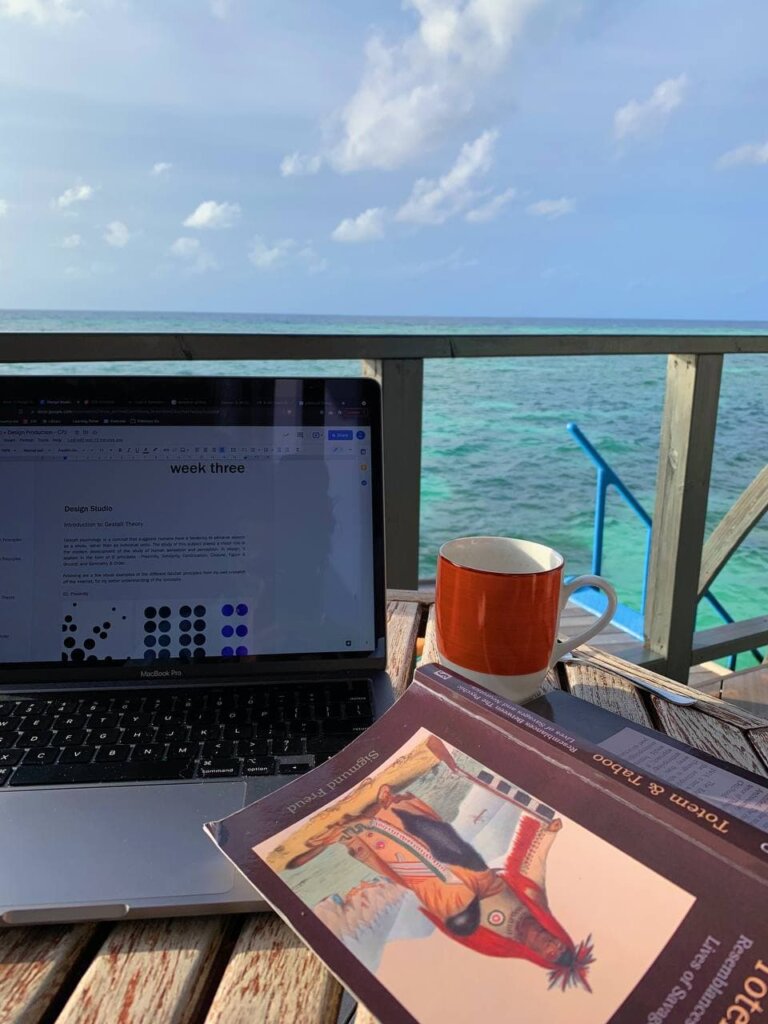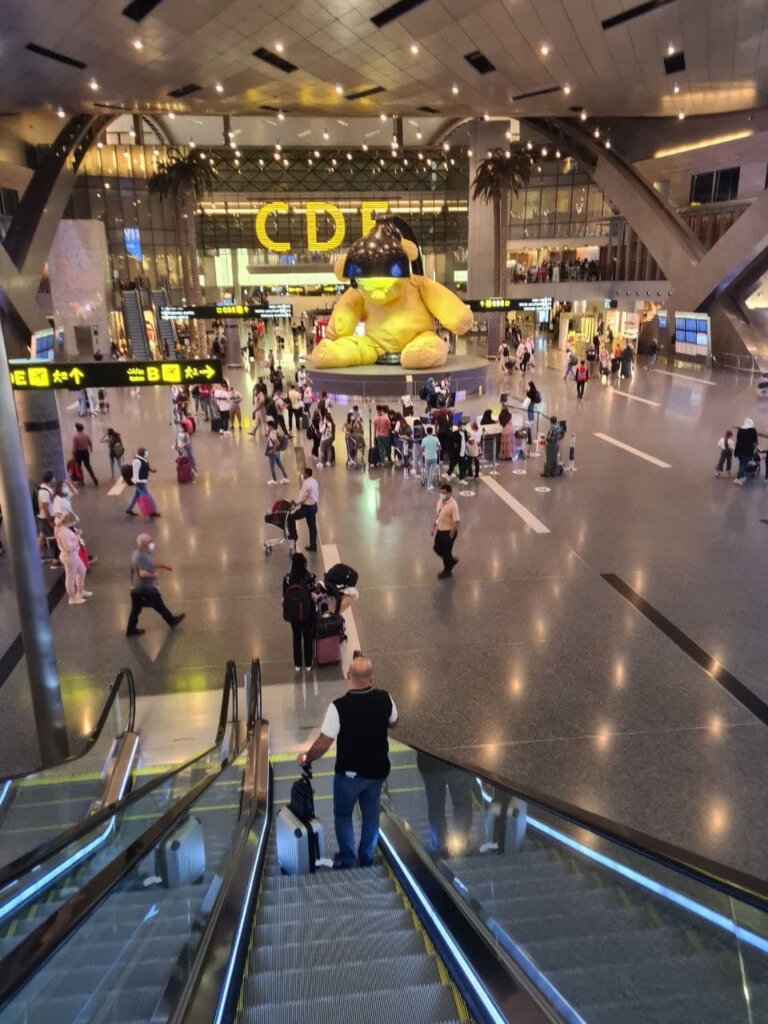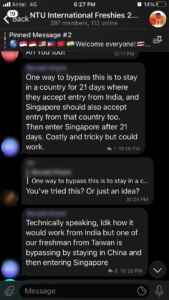Photo Credit: Yousuf Alfuhigi
By Srinidhi Ragavendran and Ezekiel L.S Sen
- With Singapore placing travel entry bans on six countries, some international students from these nations are “hopping” to other countries before flying here.
- Many of them are fed up with learning remotely, while some are worried schools will scale down online lessons next semester and leave them hanging.
- But country-hopping is expensive, and with an estimated price of S$8,000, not all international students can afford the gamble.
Fresh ocean breeze slips through the canopy sheers over Tanvi Bharti’s bed as she looks for the perfect spot to snap her photo assignment. While her coursemates navigate their photography module from school studios and facilities, the Lasalle College of the Arts freshman makes do with the flash on her iPhone. That, and the sweet, pristine Maldivian sunlight.
Her villa near the crystal blue sea may be the luxury locale of dreams, but Tanvi, who hails from India, is not in the Maldives for leisure. Her 21-day stay there is part of a larger plan for the design communication undergraduate to finally arrive in Singapore and pursue her university education.
It’s a last resort for Tanvi, who told Soapbox she would rather take a gap year than continue studying online while paying full school fees.
“A huge chunk of my classes can be done online… but I’m struggling,” she said.

After being barred from entering Singapore this semester, international freshmen enrolled in universities here are working around the Government’s travel restrictions on their home countries by “country-hopping” — flying to a third nation Singapore accepts travellers from, then making their way here.
The journey can span weeks to a month, depending on quarantine orders mandated by the countries where they make their first stop. It also costs students an estimated total of S$8,000 for air fare, hotel stays, and Covid-19 tests.
Country-hopping isn’t a novel concept. Indian students have been using this method to get into Canada, which has also blocked direct flights from India, according to The Economic Times of India.
Tanvi was one of the first international students to try it as a method of entering Singapore during the pandemic. Despite initial skepticism from her peers, some of them are now interested in following suit.
When asked by Soapbox, 21 out of 70 international students stuck in their home countries said they were seriously considering travelling to another country in order to enter the Republic afterward.
Many are anxious to get into Singapore by next semester as they are unsure if their universities will continue to allow them to take classes remotely, which they have been doing this semester. Some are plain tired of online classes and want to learn on campus to make the most of their school fees, while others are worried they cannot fulfill their graduation requirements while overseas.
These students are from the six countries that Singapore has banned travel entry from — India, Bangladesh, Myanmar, Sri Lanka, Nepal and Pakistan. The restrictions have been in place since February, with no word yet on when they will ease.
But if students travel first to countries such as the Maldives — where Tanvi is holed up now — or Germany, they can serve a quarantine order there and then fly on to Singapore. Once they arrive here, they will have to serve either a 7-day or 14-day stay-home notice.
Tanvi started planning her country-hopping trip after a meeting with her school dean, where she was told that continued online learning would have implications on her academic career. She chose the Maldives, which is about 1,100 km south of India, because it is close to her home country and is reporting only 115 coronavirus infections a day on average as of Sep 22.
When Tanvi first announced her travel plans to her fellow international Lasalle batchmates in a group chat, many of them were sceptical, confused, and even concerned. “One girl even asked me if it was illegal to do so,” said Tanvi.
But now, after seeing Tanvi successfully fly to the Maldives, some of them are warming to the idea. Several have already booked tickets to countries like Dubai and Germany. “I set the ball rolling… Now that I’m here, four or five people texted me back and are asking about the process,” she said.

Another country-hopper is Najah Ismail, 18, a freshman from NTU’s School of Computer Science and Engineering who arrived in Singapore on Aug 9.
Before that, she travelled in May from India, her home country, to Qatar, where she has residency status.
Najah said that she deliberated for three weeks before choosing to fly, concerned about the heavy financial cost and higher risk of being infected by Covid-19 while in transit.
“You just sometimes stay up and think about all the money that you spent and if it was worth it,” said Najah. Still, she made the decision because she wanted to get the on-campus university experience that she was paying for.
Country-hopping tales like Najah’s and Tanvi’s spread like wildfire within those in the NTU international student community still studying from their home nations. WhatsApp and Telegram groups seen by Soapbox were flooded with students asking each other questions about entry approvals and travel costs.
Richelle Adarsh, 18, a freshman studying in NTU’s school of Social Sciences, started planning her own country-hopping trip to Singapore after hearing that others were doing so.
The Indian national bought a flight to the United Arab Emirates, where she expects to be quarantined for 21 days, per the country’s rules, before coming to Singapore.
She said that the uncertainty surrounding the upcoming semester prompted her to take the plunge. While most NTU international freshmen were given the option to attend classes via remote learning this semester, many are unsure if similar arrangements will be made for next semester.
Not all international students are for country-hopping
Meanwhile, some international students enrolled in schools here are choosing to hinge their hopes on a petition to the Immigration and Checkpoints Authority (ICA).
Faiz Yusuf, 22, a postgraduate student from India who is enrolled in the ESSEC Business School here, started a Facebook petition with his friends for ICA to make exceptions for Indian students to enter Singapore. The proposed plan is for Indian students to quarantine once in India before flying off, and a second time after arriving in Singapore.
More than 300 students signed the petition within a week of Faiz posting it. He said he never expected such a response, and was originally hoping to get a response from around 200 people to commit to a flight to Singapore.
Faiz said he and his friends have yet to receive a concrete response to his petition from authorities.
Part of the reason why he started the petition was to create an alternative to country-hopping. “[Country-hopping] is not economically viable to many and is still a gamble because entry approval is not guaranteed,” said Faiz when asked why he wanted to start the petition.
Some are still sceptical about country-hopping, and prefer to wait and see if restrictions will open up.
Simran Wagle, 18, a Year 1 student from India enrolled in NTU’s School of Social Sciences, is afraid of being stranded in her layover country, given the unstable border situation around the world. To Simran, that risk would not be worth the money.
Aaradh Nepal, 18, an NTU computer science and engineering freshman from Nepal, agreed. “If push comes to shove, maybe I can consider it,” he said.
Indian national Nirvik Sahu, another 18-year-old NTU computer science and engineering student, said he might drop out of the university instead, if travel restrictions do not ease by January.
In the meantime, students who have already committed to country-hopping are holding their breath, hoping their plans will succeed.
“All the opinions from people everywhere can make you doubt your own decisions in some way… but it’s a one-time thing and I don’t think there will be hiccups,” said Tanvi.







